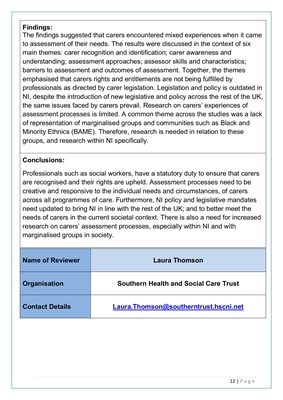
12 | P a g e
Findings:
The findings suggested that carers encountered mixed experiences when it came
to assessment of their needs. The results were discussed in the context of six
main themes: carer recognition and identification; carer awareness and
understanding; assessment approaches; assessor skills and characteristics;
barriers to assessment and outcomes of assessment. Together, the themes
emphasised that carers rights and entitlements are not being fulfilled by
professionals as directed by carer legislation. Legislation and policy is outdated in
NI, despite the introduction of new legislative and policy across the rest of the UK,
the same issues faced by carers prevail. Research on carers' experiences of
assessment processes is limited. A common theme across the studies was a lack
of representation of marginalised groups and communities such as Black and
Minority Ethnics (BAME). Therefore, research is needed in relation to these
groups, and research within NI specifically.
Conclusions:
Professionals such as social workers, have a statutory duty to ensure that carers
are recognised and their rights are upheld. Assessment processes need to be
creative and responsive to the individual needs and circumstances, of carers
across all programmes of care. Furthermore, NI policy and legislative mandates
need updated to bring NI in line with the rest of the UK; and to better meet the
needs of carers in the current societal context. There is also a need for increased
research on carers' assessment processes, especially within NI and with
marginalised groups in society.
Name of Reviewer
Laura Thomson
Organisation
Southern Health and Social Care Trust
Contact Details
laura.thomson@southerntrust.hscni.net